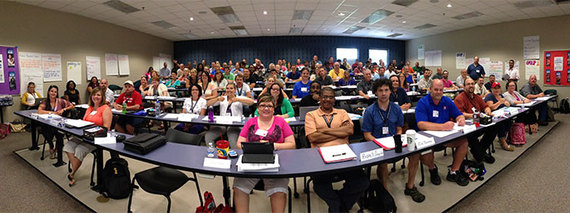By Jennifer Heuertz
This post was originally published on the TNTP Blog.
What happens when you put high school students in classrooms led by practitioners with skills in a range of technical fields—nursing, welding, construction and more—but not much teaching experience? Can they be successful?
In Tennessee, we’re wrestling with those questions through the Occupational License New Teacher Training program, launched in 2013 in partnership with the TN Department of Education’s Division of Career and Technical Education (CTE). It’s part of Tennessee’s statewide effort to move away from the old model of vocational education, which often emphasized vocational skills at the expense of academic rigor, and embrace a new approach that exposes students to both academic and career-oriented coursework.
Why? Because while there are plenty of opportunities for well-paid careers in technical fields, those fields increasingly demand fluency in old fashioned skills like reading complex textual information, deciphering data, and communicating coherently in writing.
There are compelling reasons to give high school students access to lessons taught by experienced practitioners in career paths of their choosing: A nurse with 25 years’ experience has technical expertise that a non-practitioner won’t, and he or she will be uniquely positioned to engage and prepare students. But this non-traditional approach to high school education requires thinking outside the box of traditional teacher training, too.
The training program in Tennessee aims to bridge the gap between practitioners’ content knowledge and the best ways to convey that knowledge to high schoolers—without requiring them to leave their work to train as teachers full-time—through an intensive, five-day pre-service program. It’s not a full teacher training regimen. It’s a primer on the foundations of teacher practice. After training 175 CTE educators, we’ve learned that there a few strategies that are critical to making such a short training work:
Focus on the basics. In the pre-service training, new CTE educators focus on instructional planning, managing a classroom and assessing students. They spend time in small groups, developing curricula for the courses they’ll teach, and they practice implementing specific classroom management techniques, receiving feedback from colleagues and then implementing that feedback until they’ve mastered the skills. The CTE teachers get an introduction to the Common Core, too, and practice incorporating literacy skills into their lessons.
Learn from veterans. A key component of the training is that the lead facilitators are veteran CTE educators themselves. Many of these teachers come from the Academies of Nashville, a comprehensive, seven-year-old CTE program in Metro Nashville Public Schools that has seen great success with students. Because the cohorts of incoming CTE educators in each district tend to be small—sometimes less than ten teachers in a group—they’re able to get lots of focused time learning and receiving feedback from veteran CTE teachers.
Consider this the jumping off point. We don’t expect CTE educators to get everything they need out of five days. But the pre-service training aims to help them transition into the classroom by exposing them to the must-haves of classroom instruction. Chris Ottinger, a welder who now teaches at Byington-Solway Career and Technical Education Center in Knox County, TN, worked with adults for 15 years before he entered the classroom. He explains that the training helped him understand how to translate his welding and manufacturing craft into teachable components. Over their first three years in the classroom, CTE educators are tasked with continuing their training through a formal teacher preparation program that they can complete while teaching.
We have to be honest: With twelve different career clusters in the program, from architecture to law enforcement, this is incredibly challenging work. But we think getting highly skilled professionals into the classroom quickly, with students who stand to really benefit from their content knowledge and experience, is critically important.
Results from the Academies of Nashville suggest that when done well, robust CTE programs can have a powerful impact on student outcomes. Since the launch of the Academies in 2006, the graduation rate in Metro Nashville Public Schools has risen by 20.9 percent, surpassing the national graduation rate and graduating 18,000 more students than were projected to graduate at MNPS’ pre-Academies rate. Although we can’t attribute this gain solely to CTE, MNPS is receiving national attention for its innovative approach to connecting high school coursework and career pathways.
We’re excited to partner with Tennessee to bring passionate practitioners to CTE classrooms that need them. In the meantime, we’re learning a ton about how to best prepare these professionals for the challenging career shift to teaching. This is all part of diversifying the ways schools can serve students—with the goal of improving outcomes for all kids—and we’ll be keeping a close watch on where it leads.
We've partnered with Tennessee to bring practitioners of technical fields into Career and Technical Education (CTE) classrooms through an intensive training program. It’s a part of the state’s effort to provide students with courses that combine valuable hands-on learning with academic rigor.
By focusing on the basics in an intensive pre-service training, we’re hoping to teamed up with Tennessee's Department of Education to create an intensive pre-service training for practitioners of technical fields to transition into teaching. By focusing on the basics we hope to give these professionals the foundation they need to share their experience with students.
Jennifer Heuertz is Training and Instruction Manager at TNTP.
